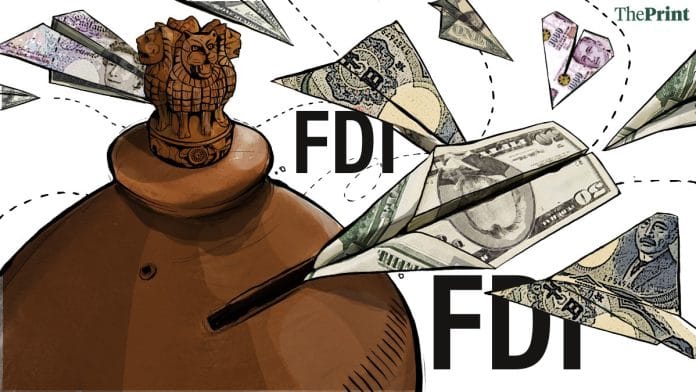India’s net foreign direct investment inflows fell from $10.58 billion in 2023 to $ 0.4 billion in 2024, the sharpest drop in two decades. This reflects global uncertainty, as well as deficiencies in the country’s business climate. The Supreme Court’s recent rulings dismissing the waiver of interest and penalty pending on the Adjusted Gross Revenue from telecom operators, and judicial sanction to dual taxation on Direct-to-Home services, may further dampen investor sentiment.
The court’s rejection of AGR waiver requests leaves telecom operators with over Rs 80,000 crore in outstanding payments. Similarly, the application of dual taxation will now allow state governments to levy entertainment tax on DTH broadcasters (service tax is already charged by the Central Government as a part of GST). At a time when private investments are already at decadal lows in the domestic market, a myopic view on tax policy may be the last straw that breaks the camel’s back.
For emerging markets like India, FDI holds the promise of technology transfer, job creation, and overall economic development. The Manmohan Singh government in 2008 relaxed FDI norms by allowing greater foreign investment in sectors such as telecom, defence, and insurance through the automatic route, which improved investor sentiment and resulted in an FDI surge. However inaction on urgent banking sector reforms eventually led to a dip in sentiment and inflows. Investor confidence and FDI inflows surged again in 2014 and 2019 on the back of the National Democratic Alliance (NDA) government’s ease of doing business, but enthusiasm has petered out over the last few years.
Tax policies are an important determinant of sentiment, because investors seek stable and predictable tax regimes. In the AGR case, the Supreme Court’s retrospective tax compliance requirements have generated significant financial repercussions for telecom companies, potentially even risking bankruptcy for certain operators. Similarly, the imposition of dual taxation and license fee demands on DTH broadcasting creates an added burden on service providers, challenging the industry’s viability and potentially leading to higher costs for consumers. These decisions also throw light on the need to review the judiciary’s role in economic regulation.
Also read: Ease of Doing Business: If World Bank sees beyond Delhi & Mumbai, India will do better
In search of tax certainty
Despite economic liberalisation, India continues to struggle to develop a consistent tax policy approach for trade and commerce. The United Progressive Alliance (UPA) government’s decision to amend the Income Tax Act in 2012 and retrospectively apply it to indirect transfers is a prime example. Besides dampening investor sentiment, the decision also attracted a slew of lawsuits by companies such as the Cairn Group and Vodafone in international courts and the Permanent Court of Arbitration. The NDA government promised reform in its 2014 manifesto, and a full seven years later, passed the Taxation Laws (Amendment) Bill 2021, which nullified the 2012 amendment.
Tax reform, then, seems always to follow from sharp economic pains. It is time for more proactive thinking on tax policy, which can no longer be guided only by the limited objective of revenue maximisation or hawkish enforcement to meet steep internal targets. This approach does little to encourage innovation, domestic value generation, or investment, and there is much evidence on offer. The retrospective application of 28 per cent GST on online real-money games in 2024 has already eroded billions of rupees in market value, and generated uncertainty and ambiguity within a high-growth digital market segment.
Also read: India’s record net FDI plunge reveals a troubling trend—outward FDI beats investing at home
A two-step approach to reform
As per the International Monetary Fund (IMF)’s Handbook on Tax Law Design and Drafting, the executive should primarily interpret tax laws. This is the case in countries like the United States, where the Internal Revenue Service issues detailed rules, regulations and procedures to interpret the legislation passed by the Congress. However, in the case of India, flawed policy modelling has led to growing judicial intervention in clarifying and settling tax controversies.
While courts play a vital role in resolving disputes, they should exercise caution in intervening and correcting market failures in dynamic and competitive markets. Judges must recognise the unique characteristics of these industries and exercise restraint, ensuring their actions support rather than hinder progress. A measured judicial approach is necessary to foster a thriving environment that benefits both industry players and the wider public.
Simultaneously, India needs a clear guidance for commercial tax policy, to sustain economic growth. The introduction of the Direct Tax Code is a step in the right direction. But the government should go further. The new wave of capital and technology intensive industries need a new tax compact; one that is pro-growth and sensitive to their needs. This can be achieved by encoding well-known tax principles as the touchstone for both rule-making and enforcement.
A well-crafted charter for commercial taxation can lay the foundation for a fairer, more efficient system. Such a charter should ensure that taxation does not distort business decisions or market behaviour by grounding itself in the principle of neutrality – so that decisions are made on economic merits alone. It should prioritise clarity and simplicity, reducing the complexity of tax obligations and making compliance more straightforward. Certainty and stability are equally vital but often ignored. Finally, the charter must be designed to keep pace with modern economic realities, adapting to digital business models that sometimes operate on wafer thin margins but produce outsize economic impact.
Samrridhi Kumar and Anugya Singh are analysts at Koan Advisory Group. Views are personal.
This article is part of ThePrint-Koan Advisory series that analyses emerging policies, laws and regulations in India’s technology sector. Read all the articles here.
(Edited by Zoya Bhatti)







Socialist India is an expert in overtaxing Indians, FDIs, breaking our backs and also that of camels’. Socialist roads break our vehicles, too. Death to socialism. Long live Libertarian party of India.